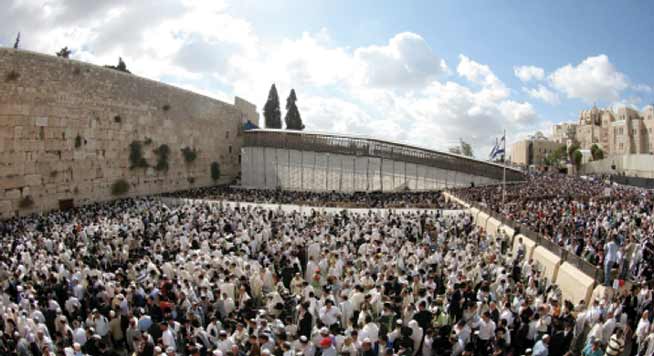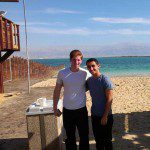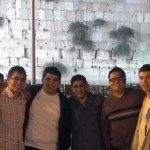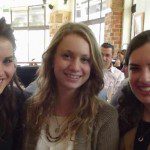
“I didn’t feel [scared] but my parents were freaking out” says Benjamin Israel about the conversation he had with his parents in November when the Israel Defense Forces began its successful (so far) campaign, Operation Pillar of Defense, to end incessant rocket attacks from Gaza into Israel. “My rabbi said, ‘We are seeing open miracles. We see how G-d controls the world,’” relates Benjamin, who assured his parents, “Don’t worry, I’m fine.” Ariel Rahimi also told his nervous parents not to worry. “I feel safe, a sense of security, closer to G-d; it’s a spiritual thing.”
Deena Rosenblatt was homesick at the beginning of this year and when the war started her mother wanted her to come home but that’s when she realized “There’s no way I can leave” at a time like this. She turned her homesickness into a passion for information about the status of events during the week long IDF offensive. “People came to me to ask me what’s going on.”
Benjamin and Ariel are two of 20 graduates from Valley Torah High School’s 28-member class of 2012, who are spending their first post high school year in Israel. Benjamin is studying at the Tiferet Yerushalayim yeshiva and Ariel is at Derech Ohr Sameach. Deena is a 2011 VTHS graduate in her second year at the Tomer Dvora seminary. Each year Israel hosts thousands of students (including at least 80% of each VTHS graduating class) from several countries in numerous yeshivot, seminaries, universities and other year-long programs throughout the country.
As the IDF was calling up its reserves and preparing for a ground invasion in the Gaza Strip, many of these teens received frantic phone calls from their parents asking them to come home. In most cases the answer was no. A good choice for many reasons, but especially since the ground invasion never happened and a cease fire was reached after eight days of the Operation.
These kids worked too hard and waited too long for this special year to give it up so quickly. They just completed four years of high school in a rigorous dual curriculum and hundreds of hours studying for and taking college entrance and advanced placement exams and filling out college applications. So why would they want to spend a year in Israel immersed in serious Torah study after this and before heading off to various universities for four or more years of demanding and competitive academic pursuits? Are these teens crazy?
Of course not! They are normal Jewish teenagers who have been raised in Orthodox or traditional homes and educated in Jewish day schools that imbue in them a love of Torah and Israel. And for many, this is their first time visiting the Jewish homeland they have learned so much about throughout their young lives.
They go to spread their wings and experience independence from their families and to explore their Jewish heritage, identity and spirituality. They live in dormitories or apartments with several students and learn 8-10 hours a day for the sole purpose of gaining a deeper understanding of Jewish texts, laws, customs and life skills. They do receive college credit in some universities.
“We encourage our students to spend a year in Israel because it allows them to solidify their direction in life,” says VTHS Dean Rabbi Avrohom Stulberger. “When you are 17 or 18, and in a spiritual environment, especially in the Holy Land, it helps you concretize who you are as a Jew and sets a pattern for your future religious commitment.
“We prepare [our students] for the academic rigors of yeshiva and seminary as well as prepare them emotionally and religiously for taking full advantage of this incredible opportunity,” Rabbi Stulberger continues. “We prepare them by stressing the importance of Israel, the importance of learning,” and the urgency of going at this time. “You’ll never have the freedom of thought and lack of pressures that you have in between your high school and college years,” he tells the students.
I met Benjamin, Ariel, Deena and three other VTHS graduates from the classes of 2011 and 2012 during their afternoon break on a sunny and unusually warm December day at the Coffee Bean on Ben Yehuda Street in Jerusalem, a popular gathering spot for seminary and yeshiva students.
The kids shared with me why they wanted to spend a year in Israel, what they have gained so far from the experience, how Pillar of Defense affected them and how they spend their days.
They all have friends and siblings who have studied in Israel before them and returned home raving about their experiences and building up the anticipation for them. “I’ve seen how it changed my siblings for the better,” says Ariel adding that he also “wanted to get a good foundation spiritually and learn how to be independent.”
Bracha Adler (’12) says she “looked up to” the girls she knew who previously attended her seminary, Maor. She felt they had good morals and views on life. Bracha wanted to spend a year in Israel to be in “a non stressful, non college environment to focus on what I want for the future.” Her first time in the country, Bracha says that being in Israel has also given her “a bigger reason to love being Jewish.”
During Pillar of Defense, “We saw how people treated the soldiers and we were proud to be part of it, proud to be Jewish,” explains Bracha who prayed daily for the soldiers’ safety. “We really felt what [the Israelis] are going through…and what it’s like to live on the edge.” Students in the Jerusalem area sought shelter twice during the Operation when sirens blared, warning of a possible rocket attack in the area. Bracha says the experience helped her realize “what to cherish in life…what really matters at the end of the day.”
Sara Leah Rosenbluth (’12) was also moved by the events of that week, especially seeing the reserve soldiers being plucked from their homes and daily routines in school or work and sent to southern Israel to defend the country. “Everyone bands together,” she observes. “Being in Israel gives you a whole different outlook on life,” says the Michlala student.
Deena has two brothers and one sister who studied in Israel after high school for one or more years and there was no doubt in her mind that she would follow in their footsteps. She says Israel has helped her get her priorities straight and shown her that there are different ways of being religious. In her personal empowerment class, Deena says she has learned how to “deal better with whatever life brings you.”
It’s not all learn and no play for these kids. They enjoy tiyulim (field trips) throughout Israel at least once a month and more during holiday breaks. They are led by experienced religious tour guides who can navigate a Tanach (Torah, Prophets and Holy Writings) like these kids can navigate their smart phones. “It brings the Torah to life. We see things living on,” says Deena, expressing her amazement at seeing in real time the same biblical places they have learned about.
The students also get a taste of what living in Israel is really like by experiencing Shabbat at the homes of their rabbis and teachers, many of whom have made aliyah from the United States. “We see how other Americans adapted to society here in Israel,” says Aryeh Istrin (’11). Some students observe this at the homes of their own relatives. Ariel, for example, has a lot of family in Israel, including grandparents in Rechovot, and he enjoys spending time with them.
For some students it takes longer to adjust to the different environment and their new found independence. During the last four months of his first year at Derech Ohr Sameach, Aryeh says he “got more into the learning and realized how much more there is to gain,” so with a little convincing from his rabbis, he decided to return for another year. “I’ve grown a lot spiritually,” he says. “The rabbis here are on another level. They want to show you how great [learning] is.” Aryeh also noted that what struck him the most during the eight days of Pillar of Defense was how the level of learning intensified.
“What we hope they gain from the experience [in Israel] is that connection to Torah, that connection to the Holy Land, the understanding of what our real values are and what really matters in life. It’s something that you just cannot pick up living in L.A.” says Rabbi Stulberger.
Does it work? “We have seen incredible results from our students who have spent a year or more in Israel…because they understand their commitment to the Jewish people, continues Stulberger. “That’s why so many of our kids become role models and community leaders. That’s why so many end up making aliyah. Obviously we take a little bit of credit for the four years in high school but that year or two [in Israel] helps them understand that we’re here to give; we’re not here to take. We at Valley Torah and [their experiences] in Israel train them to be givers. That’s really what it’s all about.”
By Linda O. Schlesinger




